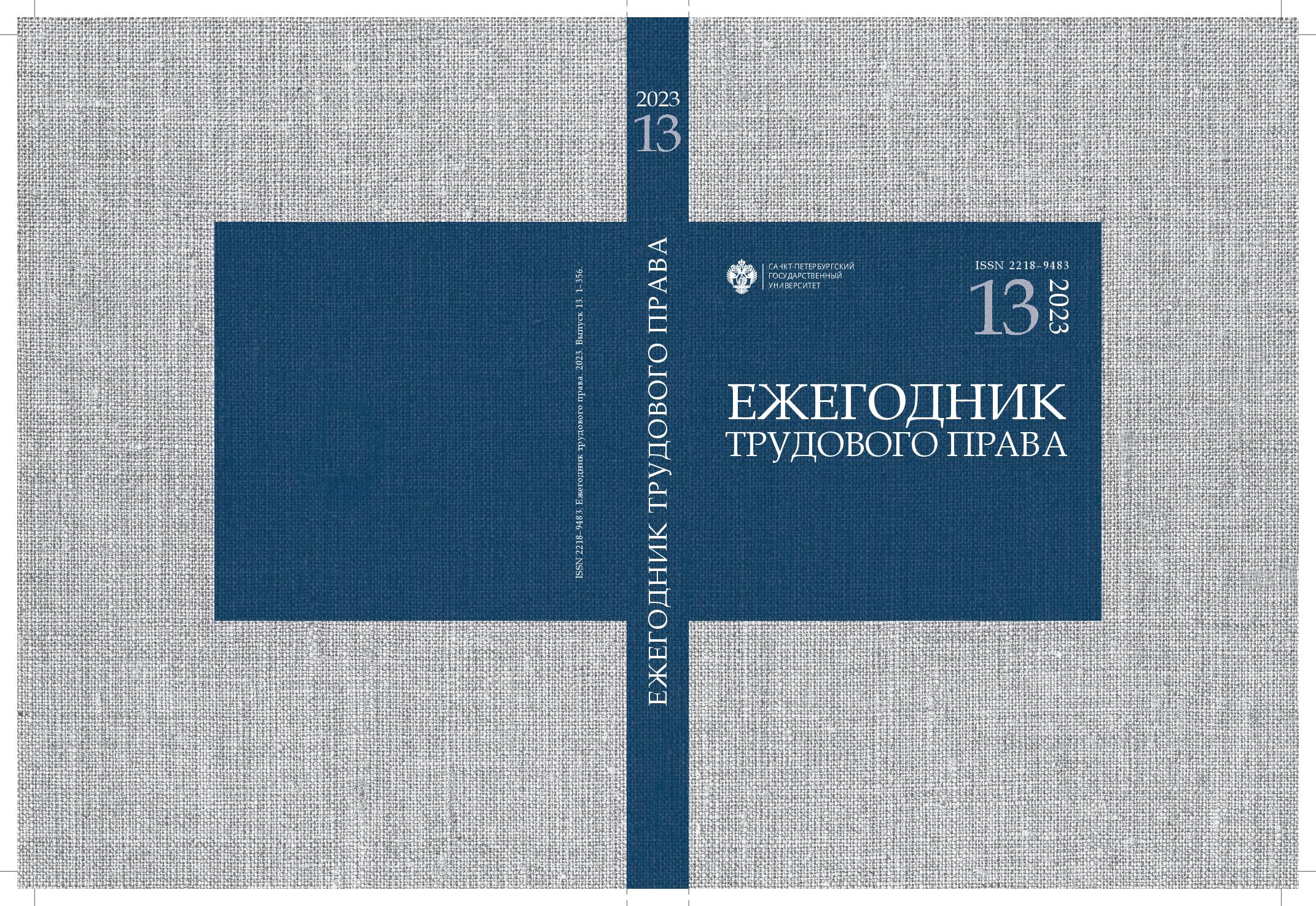Соблюдение религиозными работниками требований к внешнему виду и правил делового этикета, установленных у работодателя
DOI:
https://doi.org/10.21638/spbu32.2023.111Аннотация
В России всё чаще возникают трудовые споры по поводу принципиальной допустимости соблюдения работниками норм исповедуемой ими религии, этического учения и возможностей для обязывания работодателей не препятствовать их соблюдению, создавая соответствующие условия применения труда. Правоприменительная практика при отсутствии ясных ориентиров в законодательстве «маскирует» такие разногласия под споры об увольнении за нарушение трудового законодательства, игнорируя их истинную дискриминационную природу. В статье подробно проанализирован один из срезов обозначенной проблемы примирения труда и религии – соблюдение религиозными работниками требований к внешнему виду и правилам делового этикета у работодателя. Рассматривая проблему, автор отталкивается от трех основных религиозных потребностей работника, которые он стремится удовлетворить в спорной ситуации противоречия требований работодателя религиозным нормам. Широко привлекая материалы зарубежной практики и анализируя российское законодательство, автор приходит к следующим выводам. Возможность удовлетворения работником такой потребности, как ношение религиозной одежды, символики или иное внешнее проявление религиозной приверженности, будет зависеть от того, какое регулирование установлено на этот счет у работодателя. Здесь же дана оценка так называемой политики религиозной нейтральности, устанавливаемой на локальном уровне. Что касается потребности работника вербально выражать свою религиозность и взгляды, то работодатель вправе запретить такие действия, если они доставляют неудобства другим работникам или клиентам, грозят потерей клиентов, имиджа работодателя, а также для исключения прозелитизма в коллективе работников. Наконец, работник по религиозным соображениям может выразить желание воздержаться от участия в корпоративных мероприятиях работодателя: принуждение работодателем к обратному однозначно образует состав косвенной дискриминации.
Ключевые слова:
Свобода вероисповедания, свобода совести, права работника, религиозные нормы, религиозный работник, религиозная одежда, политика нейтральности, религиозные запреты
Скачивания
Библиографические ссылки
Библиография
Alidadi, Khatayoun. 2012. “Reasonable Accommodations for Religion and Belief: Adding Value to Article 9 ECHR and the European Union’s Anti-Discrimination Approach to Employment?” European Law Review 6: 693-715.
Machados, Juan. 2015. “Religious freedom and accommodation of conflicting worldviews in the workplace”. Law and Religion in the Workplace. Proceedings of the XXVII-th Annual Conference Alcalá de Henares. Granada: 29-33.
Емелин, Михаил Ю. 2019. «Религиозные права в решениях Верховного суда США по трудовым спорам». Актуальные проблемы развития общества, экономики и права. Сборник научных статей молодых преподавателей и аспирантов. Москва: 35-42.
Кулакова, Ольга С., Погодина, Ирина В. 2021. «Дискриминация по религиозному признаку в трудовых отношениях». Кадровик 12: 36-43.
Кулакова, Ольга С., Погодина, Ирина В. 2021. «Религиозные стереотипы в трудовых отношениях». Вопросы трудового права 10: 739-747.
Ногайлиева, Фатима К. 2018. «Содержание трудового правоотношения с работником, соблюдающим религиозные нормы». Юридическая наука 5: 44-48.
Явич, Лев С. 1976 Общая теория права. Л.: Издательство Ленинградского государственного университета.
References
Alidadi, Khatayoun. 2012. “Reasonable Accommodations for Religion and Belief: Adding Value to Article 9 ECHR and the European Union’s Anti-Discrimination Approach to Employment?” European Law Review 6: 693-715. (In English)
Machados, Juan. 2015. “Religious freedom and accommodation of conflicting worldviews in the workplace”. Law and Religion in the Workplace. Proceedings of the XXVII-th Annual Conference Alcalá de Henares. Granada: 29-33. (In English)
Emelin, Mikhail Y. 2019. “Religious Rights in U.S. Supreme Court Labor Decisions”. Actual problems of development of society, economy and law. Collection of scientific articles of young teachers and graduate students. Moscow: 35-42. (In Russian)
Kulakova, Olga S., Pogodina, Irina V. 2021. “Religious Discrimination in Labor Relations”. Kadrovik 12: 36-43. (In Russian)
Kulakova, Olga S., Pogodina, Irina V. 2021. “Religious Stereotypes in Labor Relations”. Voprosy trudovogo prava 10: 739-747. (In Russian)
Nogailiyeva, Fatima K. 2018. “The content of the employment relationship with an employee who observes religious norms”. Yuridicheskaya nauka 5: 44-48. (In Russian)
Yavitch, Lev S. 1976. General Theory of Law. Leningrad: Izdatelstvo Leningradskogo gosudarstvennogo universiteta. (In Russian)
Загрузки
Опубликован
Как цитировать
Выпуск
Раздел
Лицензия
Статьи журнала «Ежегодник трудового права» находятся в открытом доступе и распространяются в соответствии с условиями Лицензионного Договора с Санкт-Петербургским государственным университетом, который бесплатно предоставляет авторам неограниченное распространение и самостоятельное архивирование.




